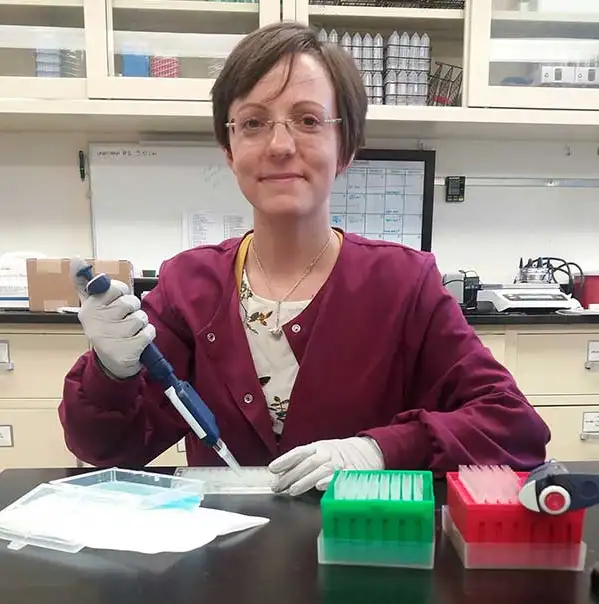Italian abroad learned the art of conducting high-grade research in meat quality
Meet Giulia Tasoniero

Imagine coming to the United States, not being fluent in the language or the culture, to participate in a research program. Sounds like a challenge, right? Not for research participant Giulia Tasoniero, Ph.D., a native of Italy. She became engulfed in the emerging myopathies in poultry.
Myopathy refers to a disorder of skeletal muscle tissue. Abnormalities within muscle fibers due to myopathies can lead to weakness and dysfunction in living tissue, having an impact on food product quality.
In 2018, Tasoniero received a doctoral degree in animal and food science from the Università degli Studi di Padova. Her thesis topic, emerging myopathies in poultry, continued to interest her, so she sought to continue researching in this field. Her adviser informed her about the U.S. Department of Agriculture (USDA) Agricultural Research Service (ARS) Research Participation Program.
The USDA ARS Research Participation Program provides opportunities for students, postgraduates, established scientists and faculty to participate in programs, projects and activities at ARS-designated facilities to help ARS solve agricultural problems of high national priority.
For her appointment, Tasoniero was stationed in the Quality and Safety Assessment Research Unit (QSARU) at the U.S. National Poultry Research Center (USNPRC) in Athens, Georgia. At QSARU, Tasoniero and her mentor, research food technologist Brian Bowker, Ph.D., focused on emerging defects in broiler chicken meat such as “woody breast”, “white striping” and “spaghetti meat.” These meat characteristics are viewed unfavorably by consumers, though they are not harmful or a food safety issue. The overall objective involved investigating the fresh meat quality attributes of the defective meat and its use in processed products. Also, the team investigated methods for enhancing the quality of these meats.
Tasoniero participated in research focused on the spaghetti meat myopathy. Spaghetti meat is an abnormality of the pectoralis muscle. These breast filets are downgraded and diverted into processed products, causing considerable economic loss. The research team evaluated the protein quality of the impacted meat.
“I hope that the resulting manuscript will provide useful information to the poultry meat industry, as the knowledge about this defect is scarce up until now,” she commented.
She appreciated the opportunity to conduct research and participate in activities such as planning experiments, researching in the lab, analyzing data and writing the resulting manuscript.
“It [the program] was a great opportunity from both a professional and personal point of view,” she said. “From a more practical point of view, I learned how to carry on many analytical procedures that I did not know before and that are useful for my activity, as well as how to plan research. From a more personal point of view, I improved skills such as solving unexpected events, collaborating in a team or independently when it was necessary.”
Tasoniero plans to continue applying her knowledge through hands-on research in meat quality issues and was elated to be a part of this program as it represented a great step in her professional and personal growth.
The USDA Agricultural Research Service Research Participation Program is funded by USDA and is administered through the U.S. Department of Energy’s (DOE) Oak Ridge Institute for Science and Education (ORISE). ORISE is managed for DOE by ORAU

